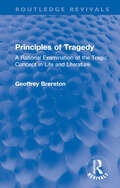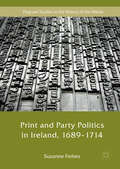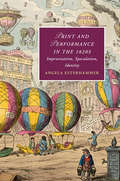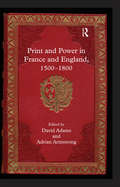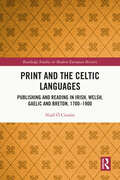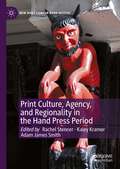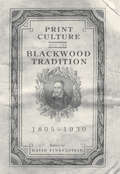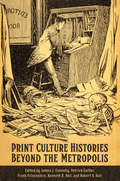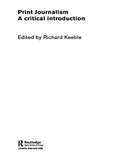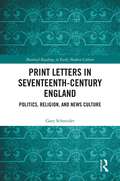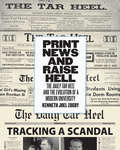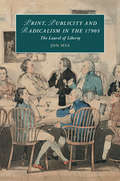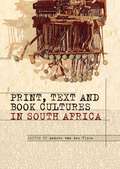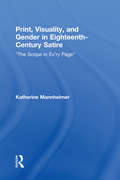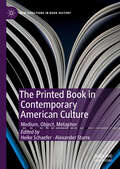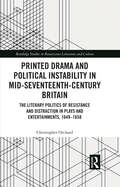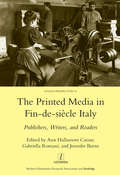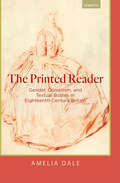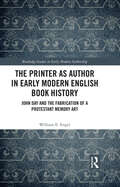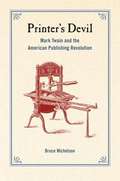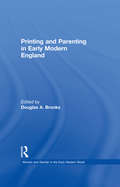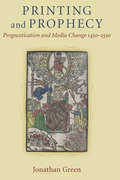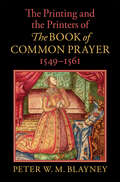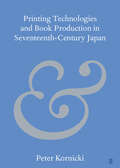- Table View
- List View
Principles of Tragedy: A Rational Examination of the Tragic Concept in Life and Literature (Routledge Revivals)
by Geoffrey BreretonWhat is tragedy? What does the term imply? The word had outgrown its original context of literature and art and acquired wider and looser meanings. Originally published in 1968, Dr Brereton seeks to establish the basis of a definition which will hold good on various planes and over a wide range of dramatic and other literature. Various theories are examined, beginning with Aristotle and taking in the Marxist interpretation and the two main religious theories of the sacrificial hero and the built-in conflict in fallen human nature. These theories are tested out on representative works by Sophocles, Shakespeare, Racine, Ibsen, Beckett and others, and the findings which emerge are developed in the course of the book. This is conceived as a re-exploration of a widely debated subject in the light of a few clear basic principles. The result is a lucid study which will be especially valuable for students of literature and drama.
Print and Party Politics in Ireland, 1689-1714 (Palgrave Studies in the History of the Media)
by Suzanne ForbesThis book is the first full-length study of the development of Irish political print culture from the Glorious Revolution of 1688-9 to the advent of the Hanoverian succession in 1714. Based on extensive analysis of publications produced in Ireland during the period, including newspapers, sermons and pamphlet literature, this book demonstrates that print played a significant role in contributing to escalating tensions between tory and whig partisans in Ireland during this period. Indeed, by the end of Queen Anne’s reign the public were, for the first time in an Irish context, called upon in printed publications to make judgements about the behaviour of politicians and political parties and express their opinion in this regard at the polls. These new developments laid the groundwork for further expansion of the Irish press over the decades that followed.
Print and Performance in the 1820s: Improvisation, Speculation, Identity (Cambridge Studies in Romanticism #127)
by Angela EsterhammerDuring the 1820s, British society saw transformations in technology, mobility, and consumerism that accelerated the spread of information. This timely study reveals how bestselling literature, popular theatre, and periodical journalism self-consciously experimented with new media. It presents an age preoccupied with improvisation and speculation – a mode of behaviour that dominated financial and literary markets, generating reflections on risk, agency, and the importance of public opinion. Print and Performance in the 1820s interprets a rich constellation of fictional texts and theatrical productions that gained popularity among middle-class metropolitan audiences through experiments with intersecting fantasy worlds and acutely described real worlds. Providing new contexts for figures such as Byron and Scott, and recovering the work of lesser-known contemporaries including Charles Mathews' character impersonations and the performances of celebrity improvvisatore Tommaso Sgricci, Angela Esterhammer explores the era's influential representations of the way identity is constructed, performed, and perceived.
Print and Power in France and England, 1500-1800
by Adrian ArmstrongWhat was the relationship between power and the public sphere in early modern society? How did the printed media inform this relationship? Contributors to this volume address those questions by examining the interaction of print and power in France and England during the 'hand-press period'. Four interconnected and overlapping themes emerge from these studies, showing the essential historical and contextual considerations shaping the strategies both of power and of those who challenged it via the written word during this period. The first is reading and control, which examines the relationship between institutional power and readers, either as individuals or as a group. A second is propaganda on behalf of institutional power, and the ways in which such writings engage with the rhetorics of power and their reception. The Academy constitutes a third theme, in which contributors explore the economic and political implications of publishing in the context of intellectual elites. The last theme is clientism and faction, which examines the competing political discourses and pressures which influenced widely differing forms of publication. From these articles there emerges a global view of the relationship between print and power, which takes the debate beyond the narrowly theoretical to address fundamental questions of how print sought to challenge, or reinforce, existing power-structures, both from within and from without.
Print and the Celtic Languages: Publishing and Reading in Irish, Welsh, Gaelic and Breton, 1700–1900 (Routledge Studies in Modern European History #102)
by Niall Ó CiosáinThis book is a study of the print cultures of the four principal Celtic languages — Irish, Welsh, Gaelic and Breton — in the crucial period between 1700 and 1900. Over the past four centuries, the Celtic languages of northwest Europe have followed contrasting paths of maintenance and decline. This was despite their common lack of official recognition and use, and their common distance from the centres of political power. This volume analyses publishing, circulation and reading in the four languages, particularly at a popular level, showing the different levels of overall activity as well as the distinctions in the types of printed texts between regions. The approach is a broad one, considering all printed books down to very small cheap formats. It explores the interactions between the different regions and the continuation of print culture within diasporic communities. This volume will appeal to book historians, to scholars of the four languages and their literature, and to students of Celtic studies.
Print Culture, Agency, and Regionality in the Hand Press Period (New Directions in Book History)
by Rachel Stenner Kaley Kramer Adam James SmithPrint Culture, Agency, and Regionality in the Hand Press Period illuminates the diverse ways that people in the British regional print trades exerted their agency through interventions in regional and national politics as well as their civic, commercial, and cultural contributions. Works printed in regional communities were a crucial part of developing narratives of local industrial, technological, and ideological progression. By moving away from understanding of print cultures outside of London as ‘provincial’, however, this book argues for a new understanding of ‘region’ as part of a network of places, emphasising opportunities for collaboration and creation that demonstrate the key role of regions within larger communities extending from the nation to the emerging sense of globality in this period. Through investigations of the men and women of the print trades outside of London, this collection casts new light on the strategies of self-representation evident in the work of regional print cultures, as well as their contributions to individual regional identities and national narratives.
Print Culture and the Blackwood Tradition
by David FinkelsteinIn late 1804, William Blackwood established a small publishing and bookselling firm in Edinburgh. Over the next 175 years, William Blackwood & Sons became one of the leading publishers in Britain, enjoying both local and international success. Early on it championed the works of Scottish writers, and later gained acclaim as the publisher of G.W. Steevens, George Eliot, Charles Whibley, and Joseph Conrad. Its political influence was also widespread; in 1817 it founded the monthly Blackwood's Magazine, which featured literary, critical, political, and journalistic commentary and analysis, and was a powerful force in British conservative politics.Two hundred years after the founding of this significant influence on British literary, political, and social history, this collection of essays reappraises the place of the Blackwood firm and its magazine in literary and print culture history. Editor David Finkelstein brings together an array of eminent scholars and critics from the US, Canada, Scandinavia, and the UK to examine Blackwoods from a variety of interdisciplinary perspectives. The resulting collection covers an impressive range of subject areas, including Romantic and Victorian literature, print culture, media history, and New Journalism.
Print Culture Histories Beyond the Metropolis
by Frank Felsenstein James J. Connolly Patrick Collier Robert Hall Kenneth R. HallBringing together leading scholars of literature, history, library studies, and communications, Print Culture Histories Beyond the Metropolis rejects the idea that print culture necessarily spreads outwards from capitals and cosmopolitan cities and focuses attention to how the residents of smaller cities, provincial districts, rural settings, and colonial outposts have produced, disseminated, and read print materials.Too often print media has been represented as an engine of metropolitan modernity. Rather than being the passive recipients of print culture generated in city centres, the inhabitants of provinces and colonies have acted independently, as jobbing printers in provincial Britain, black newspaper proprietors in the West Indies, and library patrons in "Middletown," Indiana, to mention a few examples. This important new book gives us a sophisticated account of how printed materials circulated, a more precise sense of their impact, and a fuller of understanding of how local contexts shaped reading experiences.
Print Journalism: A Critical Introduction
by Richard KeeblePrint Journalism provides an up-to-date overview of the skills needed to work within the newspaper and magazine industries. This critical approach to newspaper and magazine practice highlights historical, theoretical, ethical and political debates and includes tips on the everyday skills of newspaper and magazine journalists, as well as tips for online writing and production. Crucial skills highlighted include: sourcing the news interviewing sub editing feature writing and editing reviewing designing pages pitching features In addition separate chapters focus on ethics, reporting courts, covering politics and copyright whilst others look at the history of newspapers and magazines, the structure of the UK print industry (including its financial organization) and the development of journalism education in the UK, helping to place the coverage of skills within a broader, critical context. All contributors are experienced practicing journalists as well as journalism educators from a broad range of UK universities.
Print Letters in Seventeenth‐Century England: Politics, Religion, and News Culture (Material Readings in Early Modern Culture)
by Gary SchneiderPrint Letters in Seventeenth-Century England investigates how and why letters were printed in the interrelated spheres of political contestation, religious controversy, and news culture—those published as pamphlets, as broadsides, and in newsbooks in the interests of ideological disputes and as political and religious propaganda. The epistolary texts examined in this book, be they fictional, satirical, collected, or authentic, were written for, or framed to have, a specific persuasive purpose, typically an ideological or propagandistic one. This volume offers a unique exploration into the crucial interface of manuscript culture and print culture where tremendous transformations occur, when, for instance, at its most basic level, a handwritten letter composed by a single individual and meant for another individual alone comes, either intentionally or not, into the purview of hundreds or even thousands of people. This essential context, a solitary exchange transmuted via print into an interaction consumed by many, serves to highlight the manner in which letters were exploited as propaganda and operated as vehicles of cultural narrative.
Print News and Raise Hell: The Daily Tar Heel and the Evolution of a Modern University
by Kenneth Joel ZogryFor over 125 years, the Daily Tar Heel has chronicled life at the University of North Carolina at Chapel Hill and at times pushed and prodded the university community on issues of local, state, and national significance. Thousands of students have served on its staff, many of whom have gone on to prominent careers in journalism and other influential fields. Print News and Raise Hell engagingly narrates the story of the newspaper's development and the contributions of many of the people associated with it. Kenneth Joel Zogry shows how the paper has wrestled over the years with challenges to academic freedom, freedom of speech, and freedom of the press, while confronting issues such as the evolution of race, gender, and sexual equality on campus and long-standing concerns about the role of major athletics at an institution of higher learning. The story of the paper, the social media platform of its day, uncovers many dramatic but perhaps forgotten events at UNC since the late nineteenth century, and along with many photographs and cartoons not published for decades, opens a fascinating window into Tar Heel history. Examining how the campus and the paper have dealt with many challenging issues for more than a century, Zogry reveals the ways in which the history of the Daily Tar Heel is deeply intertwined with the past and present of the nation's oldest public university.
Print, Publicity, and Popular Radicalism in the 1790s: The Laurel of Liberty (Cambridge Studies in Romanticism)
by Jon MeeJon Mee explores the popular democratic movement that emerged in the London of the 1790s in response to the French Revolution. Central to the movement's achievement was the creation of an idea of 'the people' brought into being through print and publicity. Radical clubs rose and fell in the face of the hostile attentions of government. They were sustained by a faith in the press as a form of 'print magic', but confidence in the liberating potential of the printing press was interwoven with hard-headed deliberations over how best to animate and represent the people. Ideas of disinterested rational debate were thrown into the mix with coruscating satire, rousing songs, and republican toasts. Print personality became a vital interface between readers and print exploited by the cast of radicals returned to history in vivid detail by Print, Publicity, and Popular Radicalism in the 1790s. This title is also available as Open Access.
Print, Text and Book Cultures in South Africa
by Andrew van VliesAn explanation of the unique role of the book and book collecting in South Africa due to the apartheidThis book explores the power of print and the politics of the book in South Africa from a range of disciplinary perspectives- historical, bibliographic, literary-critical, sociological, and cultural studies. The essays collected here, by leading international scholars, address a range of topics as varied as: the role of print cultures in contests over the nature of the colonial public sphere in the nineteenth century; orthography; iimbongi, orature and the canon; book- collecting and libraries; print and transnationalism; Indian Ocean cosmopolitanisms; books in war; how the fates of South African texts, locally and globally, have been affected by their material instantiations; photocomics and other ephemera; censorship, during and after apartheid; books about art and books as art; local academic publishing; and the challenge of 'book history' for literary and cultural criticism in contemporary South Africa.
Print, Visuality, and Gender in Eighteenth-Century Satire: “The Scope in Ev’ry Page” (Routledge Studies in Eighteenth-Century Literature)
by Katherine MannheimerThis study interprets eighteenth-century satire’s famous typographical obsession as a fraught response to the Enlightenment’s "ocularcentric" epistemological paradigms, as well as to a print-cultural moment identified by book-historians as increasingly "visual" — a moment at which widespread attention was being paid, for the first time, to format, layout, and eye-catching advertising strategies. On the one hand, the Augustans were convinced of the ability of their elaborately printed texts to function as a kind of optical machinery rivaling that of the New Science, enhancing readers’ physical but also moral vision. On the other hand, they feared that an overly scrutinizing gaze might undermine the viewer’s natural faculty for candor and sympathy, delight and desire. In readings of Pope, Swift, and Montagu, Mannheimer shows how this distrust of the empirical gaze led to a reconsideration of the ethics, and most specifically the gender politics, of ocularcentrism. Whereas Montagu effected this reconsideration by directly satirizing both the era’s faith in the visual and its attendant publishing strategies, Pope and Swift pursued their critique via print itself: thus whether via facing-page translations, fictional editors, or disingenuous footnotes, these writers sought to ensure that typography never became either a mere tool of (or target for) the objectifying gaze, but rather that it remained a dynamic and interactive medium by which readers could learn both to see and to see themselves seeing.
The Printed Book in Contemporary American Culture: Medium, Object, Metaphor (New Directions in Book History)
by Heike Schaefer Alexander StarreThis essay collection explores the cultural functions the printed book performs in the digital age. It examines how the use of and attitude toward the book form have changed in light of the digital transformation of American media culture. Situated at the crossroads of American studies, literary studies, book studies, and media studies, these essays show that a sustained focus on the medial and material formats of literary communication significantly expands our accustomed ways of doing cultural studies. Addressing the changing roles of authors, publishers, and readers while covering multiple bookish formats such as artists’ books, bestselling novels, experimental fiction, and zines, this interdisciplinary volume introduces readers to current transatlantic conversations on the history and future of the printed book.
Printed Drama and Political Instability in Mid-Seventeenth Century Britain: The Literary Politics of Resistance and Distraction in Plays and Entertainments from 1649-1658 (Routledge Studies in Renaissance Literature and Culture)
by Christopher OrchardPrinted Drama and Political Instability in Mid-Seventeenth Century Britain: The Literary Politics of Resistance and Distraction in Plays and Entertainments from 1649-1658 describes the function of printed drama in 1650s Britain. After the regicide of 1649, printed plays could be interpreted by Royalist readers as texts of resistance to the republic and protectoral governments respectively. However, there were often discrepancies between the aspirational content of these plays and the realities facing a Royalist party who had been defeated in the civil wars. Similarly, plays with a classically republican Roman setting failed to offer a successful model for the new republic. Consequently, writers who supported the new republic and, eventually, Cromwell’s protectoral government, proposed entertainments, based around the concept of the sublime, whose purpose was affect: that is, creating political amnesia in the audience, thereby nullifying any political dissatisfaction with a non-monarchical form of government. This volume will appeal to students and scholars of seventeenth century literature, and of the political history of 1640s and 1650s Britain.
Printed Media in Fin-de-siecle Italy: Publishers, Writers, and Readers
by Ann Hallamore Caesar"The Unification of Italy in 1870 heralded a period of unprecedented change. While successive Liberal governments pursued imperial ventures and took Italy into World War One on the Allied side, on the domestic front technological advance, the creation of a national transport network, the expansion of state education, internal migration to cities and the rise of political associations all contributed to the rapid expansion of the print industry and the development of new and highly diversified reading publics. Drawing on publishers'archives, letters, diaries, and printed material, this book provide the most up-to-date research into the printed media - books, magazines and journals - in Italy between 1870 and 1914. With essays on publishers and reading communities, the professionalization of the role of journalist and writer, children's literature, book illustrations, and printed media in colonial territories among others, this book is intended for those with interests in cultural production and consumption and questions of nation-formation and nationhood in and outside Italy. With the contributions: Ann Hallamore Caesar, Gabriella Romani- Introduction John Davis- Media, Markets and Modernity: The Italian Case, 1870-1915 Maria Grazia Lolla- Reader/Power: The Politics and Poetics of Reading in Post-Unification Italy Joseph Luzzi- Verga Economicus: Language, Money, and Identity in I Malavoglia and Mastro-don Gesualdo Olivia Santovetti- The Cliche of the Romantic Female Reader and the Paradox of Novelistic Illusion: Federico De Roberto's L'Illusione (1891) Francesca Billiani- Intellettuali militanti, funzionari e tecnologici, etica ed estetica in tre riviste fiorentine d'inizio secolo: Il Regno, La Voce, e Lacerba (1903-1914) Luca Somigli- Towards a Literary Modernity all'italiana: A Note on F. T. Marinetti's Poesia Silvia Valisa- Casa editrice Sonzogno. Mediazione culturale, circuiti del sapere ed innovazione tecnologica nell'Italia unificata (1861-1900) Matteo Salvadore- At the Borders of 'Dark Africa': Italian Expeditions to Ethiopia and the Bollettino della Societa Geografica Italiana, 1867-1887 Ombretta Frau- L'editore delle signore: Licinio Cappelli e la narrativa femminile fra Otto e Novecento Cristina Gragnani- Il lettore in copertina. Flirt rivista di splendore e declino (Primo tempo: 1897-1902) Fiorenza Weinapple- Abbiamo fatto l'Italia. Adesso si tratta di fare gli Italiani. Il Programma di educazione nazionale del Secolo XX Fabio Gadducci, Mirko Tavosanis- Printers, Poets, Publishers and Painters: The First Years of the Giornale per i bambini John P. Welle- The Magic Lantern, the Illustrated Book, and the Beginnings of the Culture Industry: Intermediality in Carlo Collodi's La lanterna magica di Giannettino"
The Printed Reader: Gender, Quixotism, and Textual Bodies in Eighteenth-Century Britain (Transits: Literature, Thought & Culture 1650-1850)
by Amelia DaleThe Printed Reader explores the transformative power of reading in the eighteenth century, and how this was expressed in the fascination with Don Quixote and in a proliferation of narratives about quixotic readers, readers who attempt to reproduce and embody their readings. Through intersecting readings of quixotic narratives, including work by Charlotte Lennox, Laurence Sterne, George Colman, Richard Graves, and Elizabeth Hamilton, Amelia Dale argues that literature was envisaged as imprinting—most crucially, in gendered terms—the reader’s mind, character, and body. The Printed Reader brings together key debates concerning quixotic narratives, print culture, sensibility, empiricism, book history, and the material text, connecting developments in print technology to gendered conceptualizations of quixotism. Tracing the meanings of quixotic readers’ bodies, The Printed Reader claims the social and political text that is the quixotic reader is structured by the experiential, affective, and sexual resonances of imprinting and impressions. Published by Bucknell University Press. Distributed worldwide by Rutgers University Press.
The Printer as Author in Early Modern English Book History: John Day and the Fabrication of a Protestant Memory Art (Routledge Studies in Early Modern Authorship)
by William E. EngelThis is the first book to demonstrate how mnemotechnical cultural commonplaces can be used to account for the look, style, and authorized content of some of the most influential books produced in early modern Britain. In his hybrid role as stationer, publisher, entrepreneur, and author, John Day, master printer of England’s Reformation, produced the premier navigation handbook, state-approved catechism and metrical psalms, Book of Martyrs, England’s first printed emblem book, and Queen Elizabeth’s Prayer Book. By virtue of finely honed book trade skills, dogged commitment to evangelical nation-building, and astute business acumen (including going after those who infringed his privileges), Day mobilized the typographical imaginary to establish what amounts to—and still remains—a potent and viable Protestant Memory Art.
Printer's Devil: Mark Twain and the American Publishing Revolution
by Bruce MichelsonThis book speaks about Mark Twain and the history of print culture in America.
Printers Without Borders
by A. E. B. ColdironThis innovative study shows how printing and translation transformed English literary culture in the Renaissance. Focusing on the century after Caxton brought the press to England in 1476, Coldiron illustrates the foundational place of foreign, especially French language, materials. The book reveals unexpected foreign connections between works as different as Caxton's first printed translations, several editions of Book of the Courtier, sixteenth-century multilingual poetry, and a royal Armada broadside. Demonstrating a new way of writing literary history beyond source-influence models, the author treats the patterns and processes of translation and printing as co-transformations. This provocative book will interest scholars and advanced students of book history, translation studies, comparative literature and Renaissance literature.
Printing and Parenting in Early Modern England (Women and Gender in the Early Modern World)
by Douglas A. BrooksThe relation between procreation and authorship, between reproduction and publication, has a long history - indeed, that relationship may well be the very foundation of history itself. The essays in this volume bring into focus a remarkably important and complex phase of this long history. In this volume, some of the most renowned scholars in the field persuasively demonstrate that during the early modern period, the awkward, incomplete transition from manuscript to print brought on by the invention of the printing press temporarily exposed and disturbed the epistemic foundations of English culture. As a result of this cultural upheaval, the discursive field of parenting was profoundly transformed. Through an examination of the literature of the period, this volume illuminates how many important conceptual systems related to gender, sexuality, human reproduction, legitimacy, maternity, kinship, paternity, dynasty, inheritance, and patriarchal authority came to be grounded in a range of anxieties and concerns directly linked to an emergent publishing industry and book trade. In exploring a wide spectrum of historical and cultural artifacts produced during the convergence of human and mechanical reproduction, of parenting and printing, these essays necessarily bring together two of the most vital critical paradigms available to scholars today: gender studies and the history of the book. Not only does this rare interdisciplinary coupling generate fresh and exciting insights into the literary and cultural production of the early modern period but it also greatly enriches the two critical paradigms themselves.
Printing and Prophecy: Prognostication and Media Change, 1450-1550
by Jonathan GreenPrinting and Prophecy: Prognostication and Media Change 1450-1550examines prognostic traditions and late medieval prophetic texts in the first century of printing and their effect on the new medium of print. The many prophetic and prognostic works that followed Europe's earliest known printed book---not the Gutenberg Bible, but theSibyl's Prophecy, printed by Gutenberg two years earlier and known today only from a single page---over the next century were perennial best sellers for many printers, and they provide the modern observer with a unique way to study the history and inner workings of the print medium. The very popularity of these works, often published as affordable booklets, raised fears of social unrest. Printers therefore had to meet customer demand while at the same time channeling readers' reactions along approved paths. Authors were packaged---and packaged themselves---in word and image to respond to the tension, while leading figures of early modern culture such as Paracelsus, Martin Luther, and Sebastian Brant used printed prophecies for their own purposes in a rapidly changing society. Based on a wide reading of many sources,Printing and Prophecycontributes to the study of early modern literature, including how print changed the relationship among authors, readers, and texts. The prophetic and astrological texts the book examines document changes in early modern society that are particularly relevant to German studies and are key texts for understanding the development of science, religion, and popular culture in the early modern period. By combining the methods of cultural studies and book history, this volume brings a new perspective to the study of Gutenberg and later printers.
The Printing and the Printers of The Book of Common Prayer, 1549–1561
by Peter W. BlayneyBibliographers have been notoriously 'hesitant to deal with liturgies', and this volume bridges an important gap with its authoritative examination of how the Book of Common Prayer came into being. The first edition of 1549, the first Grafton edition of 1552 and the first quarto edition of 1559 are now correctly identified, while Peter W. M. Blayney shows that the first two editions of 1559 were probably finished on the same day. Through relentless scrutiny of the evidence, he reveals that the contents of the 1549 version continued to evolve both during and after the printing of the first edition, and that changes were still being made to the Elizabethan revision weeks after the Act of Uniformity was passed. His bold reconstruction is transformative for the early Anglican liturgy, and thus for the wider history of the Church of England. This major, revisionist work is a remarkable book about a remarkable book.
Printing Technologies and Book Production in Seventeenth-Century Japan (Elements in Publishing and Book Culture)
by Peter KornickiThis Element first sets the history of printing in Japan in its East Asian context, showing how developments in China, Korea and elsewhere had an impact upon Japan. It then undertakes a re-examination of printing in seventeenth-century Japan and in particular explores the reasons why Japanese printers abandoned typography less than fifty years after it was introduced. This is a question that has often been posed but never satisfactorily answered, but this Element takes a new approach, focusing on two popular medical texts that were first printed typographically and then xylographically. The argument presented here is that the glosses relied upon by Japanese readers could be much more easily be provided when printing xylographically: since from the early seventeenth century onwards printed books customarily included glosses for the convenience of readers, this was surely the reason for the abandonment of typography.
